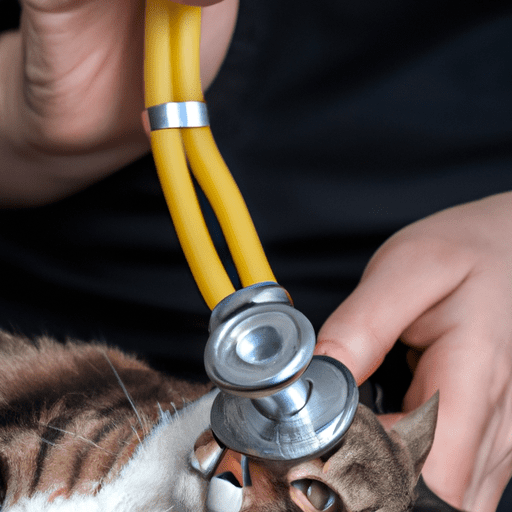As a responsible cat owner, ensuring the health and well-being of your furry friend is of utmost importance. That’s why regular vet checkups for your cat should be a top priority. These checkups not only allow your veterinarian to monitor your cat’s overall health, but they also help identify any potential health issues before they escalate into more serious problems. From vaccinations and dental care to preventative measures against parasites, regular vet checkups provide the necessary care and attention that your cat needs to live a healthy and happy life. So, make it a habit to schedule those checkups and give your feline companion the best care possible.
The Benefits of Regular Vet Checkups
Regular vet checkups are crucial for maintaining the health and wellbeing of your cat. By scheduling routine visits to the veterinarian, you can enjoy the following benefits:
Early Detection of Health Issues
One of the primary benefits of regular vet checkups is the early detection of health issues. Just like humans, cats can also develop various health problems, ranging from minor to serious. By bringing your cat to the vet on a regular basis, the veterinarian can perform thorough physical examinations and screenings to identify any potential health concerns. Early detection allows for prompt intervention and treatment, increasing the chances of a positive outcome for your feline friend.
Prevention of Health Problems
Another significant advantage of regular vet checkups is the prevention of health problems. During these visits, your vet will not only examine your cat but also provide preventive care measures to minimize the risk of illnesses. This includes vaccinations to protect against common diseases and parasite prevention to safeguard your furry companion from fleas, ticks, and worms. Preventive measures can go a long way in ensuring your cat stays healthy and happy.
Improved Quality of Life
By regularly visiting the vet, you can significantly improve your cat’s quality of life. Through routine checkups, your vet can monitor your cat’s overall health and address any emerging concerns promptly. Identifying and treating health issues early on can help prevent them from progressing and causing discomfort or pain for your beloved pet. With proper veterinary care, your cat can enjoy a higher quality of life, with increased vitality and longevity.
Reduced Healthcare Costs
Regular vet checkups can also help reduce healthcare costs in the long run. By addressing any health issues early on, you can avoid costly treatments or surgeries that may be necessary if conditions are left untreated. Routine checkups also allow for proactive preventive care, which can help prevent the development of more severe and expensive health problems. Investing in regular vet visits can ultimately save you money by catching and treating potential issues before they become more complex and costly to address.
Addressing Behavioral Concerns
Vet checkups are not only about physical health but also about addressing behavioral concerns. Cats can exhibit various behavioral issues, such as aggression, excessive meowing, litter box problems, and anxiety. During routine checkups, you can discuss these concerns with your vet, who can provide guidance and offer solutions to help manage and improve your cat’s behavior. By addressing behavioral concerns, you can enhance the overall wellbeing and happiness of your feline companion.
Frequency of Vet Checkups
To ensure comprehensive care for your cat, it’s essential to understand the recommended frequency of vet checkups throughout different stages of their life.
Kittenhood
During the kittenhood stage, your feline friend requires special attention and care. Kittens are more vulnerable to health issues, and their immune systems are still developing. As such, they need frequent visits to the veterinarian for essential examinations and preventive measures.
Adult Cat Stage
Once your cat reaches adulthood, the frequency of vet checkups may decrease. However, regular visits are still crucial to monitor their health, provide preventive care, and address any emerging concerns promptly.
Senior Cat Stage
As your cat enters the senior stage of life, they become more susceptible to age-related health issues. Therefore, regular vet checkups become even more critical during this stage to monitor their overall health, manage chronic conditions, and ensure their comfort and wellbeing.
Kittenhood Vet Checkups
During your kitten’s early months of life, it’s vital to establish a strong foundation of health and wellness through regular vet checkups. Here are the key aspects to focus on during these visits:
First Checkup
The first vet checkup for your kitten is crucial. It usually takes place when they are around 8-12 weeks old. During this visit, the vet will conduct a thorough physical examination to assess your kitten’s overall health and detect any congenital or developmental abnormalities. The vet will also discuss important topics such as nutrition, parasite prevention, and vaccinations.
Vaccinations
Vaccinations play a crucial role in protecting your kitten from various contagious diseases. Depending on the recommendations of your veterinarian, your kitten may receive a series of vaccinations to safeguard them against conditions such as feline distemper, feline leukemia, and rabies. Follow your vet’s guidance on the appropriate vaccination schedule for your kitten.
Parasite Prevention
Kittens are particularly susceptible to parasites, such as fleas, ticks, and intestinal worms. Your veterinarian will discuss the importance of parasite prevention and may recommend regular deworming treatments and topical or oral products to protect against fleas and ticks.
Spaying or Neutering
In many cases, your vet will recommend spaying or neutering your kitten. Besides preventing unwanted pregnancies, these procedures offer several health benefits, such as reducing the risk of certain cancers and eliminating the occurrence of reproductive-related issues.
Diet and Nutrition
During kittenhood, the right nutrition is crucial for proper growth and development. Your vet will provide guidance on choosing a high-quality kitten food and establishing a feeding schedule. They may also discuss the importance of a balanced diet to ensure optimal health and prevent obesity.
Adult Cat Stage Vet Checkups
While the frequency of vet checkups may decrease during the adult cat stage, regular visits are still essential to maintain your cat’s health and wellbeing. Here are the key aspects to consider during these visits:
Annual Checkups
As adult cats generally have a more stable health condition, annual checkups are typically recommended. These visits allow the vet to evaluate your cat’s overall health, conduct preventive care measures, assess the effectiveness of any treatments or medications, and address any concerns you may have.
Vaccinations
Some vaccinations require annual boosters to maintain their effectiveness. Your vet will design a vaccination schedule tailored to your cat’s specific needs and risk factors. Vaccinations help ensure your adult cat’s ongoing protection against common diseases and contribute to their overall health and longevity.
Dental Care
Dental health is crucial for adult cats. During vet checkups, the veterinarian will examine your cat’s teeth and gums, looking for signs of dental disease, such as tartar buildup, gingivitis, or oral infections. The vet may recommend professional dental cleanings or advise on at-home dental care routines to maintain your cat’s oral health.
Weight and Nutrition
Maintaining a healthy weight is essential for your adult cat’s overall health and longevity. During checkups, the vet will assess your cat’s body condition and discuss their diet and nutrition. They may recommend adjusting the feeding amount or switching to a specialized diet if necessary.
Preventive Care
Preventive care measures, such as parasite prevention and regular checkups, are still crucial during the adult cat stage. Preventing common health issues, such as fleas, ticks, heartworms, or intestinal worms, can contribute to your cat’s overall wellbeing and reduce the risk of potential complications.
Senior Cat Stage Vet Checkups
As your cat enters the golden years, regular vet checkups become even more important to ensure their comfort and address age-related health concerns. Here’s what to focus on during these visits:
Bi-annual Checkups
Senior cats require more frequent vet checkups to monitor their health and address any emerging issues promptly. Bi-annual visits allow the vet to assess your cat’s overall condition, manage chronic conditions, and make necessary adjustments to their healthcare plan.
Senior-specific Health Concerns
Older cats are prone to various age-related health concerns, such as arthritis, dental disease, kidney disease, or hyperthyroidism. During senior cat checkups, the vet will pay extra attention to these issues, performing additional screenings or tests as needed to ensure your cat’s wellbeing.
Dietary Adjustments
As your cat ages, their nutritional needs may change. Your vet may recommend adjusting their diet to accommodate age-related changes in metabolism, weight management, or specific health conditions. The vet will provide guidance on selecting senior cat food and any necessary dietary supplements.
Joint and Mobility Issues
Arthritis and joint problems are common among senior cats, often leading to reduced mobility and discomfort. During checkups, the vet will examine your cat’s joints, assess their range of motion, and make recommendations for managing pain and increasing comfort, such as supplements or medications.
Monitoring Chronic Conditions
Senior cats may have chronic conditions that require ongoing management and monitoring, such as kidney disease, diabetes, or hyperthyroidism. Regular vet checkups allow the veterinarian to assess the progression of these conditions, adjust treatments accordingly, and ensure your cat’s comfort and quality of life.
Finding a Trusted Veterinarian
When it comes to your cat’s health, finding a trusted veterinarian is paramount. Here are some tips to help you find the right veterinarian for your feline companion:
Ask for Recommendations
Reach out to friends, family, or fellow cat owners for recommendations on trustworthy veterinarians in your area. Personal experiences and positive referrals can be invaluable in finding a reliable veterinary professional.
Research and Credentials
Once you have some potential options, research the veterinarians and their credentials. Check if they are licensed and affiliated with professional organizations. Look for online reviews or testimonials to gauge the experiences of other pet owners.
Visit the Clinic
Schedule a visit to the clinic to get a feel for the environment and interact with the staff. A clean and well-equipped clinic, along with a friendly and knowledgeable team, is essential for a positive experience for both you and your cat.
Communication and Trust
Communication is key when it comes to veterinary care. During your initial consultation, assess how well the veterinarian listens to your concerns, explains procedures and treatments, and responds to any questions you may have. Building a strong rapport and trust with your vet is essential for a successful veterinary-client relationship.
Emergency Care Availability
Find out if the veterinarian offers emergency care services or has affiliations with nearby emergency clinics. Prompt access to emergency care is crucial in case of unexpected situations or serious health emergencies outside regular business hours.
Preparing for a Vet Checkup
Proper preparation can make your cat’s vet checkup experience smoother and less stressful. Here are some tips to help you prepare:
Gather Important Information
Before the appointment, make note of any changes in your cat’s behavior, eating habits, or litter box habits. Gather any relevant medical records, such as vaccination history or previous test results, to provide a comprehensive overview of your cat’s health to the veterinarian.
Prepare Necessary Documents
Ensure you have all necessary documents, such as your cat’s identification tags, microchip information, and insurance or payment details. Having everything readily available can help streamline the check-in process at the veterinary clinic.
Handling and Transportation
Practice safe and gentle handling techniques to ensure your cat feels secure during transportation to the clinic. If your cat is anxious or fearful, consider using a carrier or crate for travel. The carrier should provide enough space, be well-ventilated, and have a comfortable bedding to help ease your cat’s stress.
Comfort and Familiarity
Bringing along a favorite toy or blanket can provide comfort and a sense of familiarity for your cat during the vet visit. It can help reduce anxiety and create a positive association with the clinic environment.
Ask Questions and Discuss Concerns
Make a list of questions or concerns you have regarding your cat’s health or behavior. Take this opportunity to discuss them with your vet during the visit. Open communication will ensure you receive the information and guidance needed to keep your cat healthy and happy.
Common Procedures during Vet Checkups
During a typical vet checkup, you can expect the following procedures to be performed:
Physical Examination
The veterinarian will perform a comprehensive physical examination of your cat, assessing their overall condition, body weight, vital signs, coat, eyes, ears, mouth, and musculoskeletal system. They will be checking for any signs of illness, pain, or abnormalities.
Vaccinations and Preventive Treatments
Depending on your cat’s age, lifestyle, and vaccination history, the vet may administer necessary vaccinations or carry out preventive treatments such as flea or tick prevention. These measures help protect against common diseases and parasite infestations.
Parasite Screening
In some cases, the vet may conduct tests to screen for parasites, such as fecal examinations to detect intestinal worms or blood tests for heartworm disease. These screenings help identify and address any underlying parasite issues that may require treatment or prevention.
Blood Work and Urine Analysis
The veterinarian may recommend blood work and urine analysis to assess your cat’s organ function, detect underlying health concerns, or monitor chronic conditions. These diagnostic tests provide valuable insights into your cat’s overall health and help guide treatment decisions if necessary.
Dental Assessment
Dental health is crucial for your cat’s overall wellbeing. The vet will examine your cat’s teeth and gums, looking for signs of tooth decay, gum disease, or oral infections. Professional dental cleanings and extractions may be recommended to maintain good oral health.
Maintaining Health and Wellness at Home
While regular vet checkups are essential, it’s equally important to maintain your cat’s health and wellness at home. Here are some key practices to incorporate into your daily routine:
Proper Nutrition and Hydration
Offer your cat a balanced and appropriate diet that meets their nutritional needs. Provide fresh and clean water at all times to ensure proper hydration. Consult with your vet regarding the appropriate diet and feeding schedule for your cat’s specific requirements.
Exercise and Mental Stimulation
Engage your cat in regular exercise and mental stimulation activities. Play with interactive toys, provide scratching posts, and set aside dedicated playtime. Physical activity and mental stimulation help prevent obesity, promote healthy muscle tone, and keep your cat’s mind sharp.
Regular Grooming
Cats require regular grooming to maintain a healthy coat and skin. Brush their fur to remove loose hair and prevent matting. Trim their nails regularly to avoid overgrowth and potential injuries. Additionally, check their ears for any signs of infection or debris and clean them gently if necessary.
Monitoring Behavior and Symptoms
Pay close attention to your cat’s behavior and monitor any changes. Watch for signs of discomfort, unusual eating habits, excessive thirst, urination issues, or changes in litter box habits. If you notice anything concerning, consult with your vet promptly.
Maintaining a Stress-Free Environment
Cats thrive in a stress-free and stimulating environment. Provide them with a dedicated space that includes cozy resting spots, hiding places, and vertical perches. Minimize exposure to loud noises or excessive commotion and offer a routine that provides predictability and stability.
Signs of a Healthy Cat
While regular vet checkups are essential, you can also monitor your cat’s health at home by observing the following signs of a healthy cat:
Clear Eyes and Ears
A healthy cat should have clear, bright eyes without any signs of redness, discharge, or excessive tearing. Additionally, their ears should be clean, odor-free, and free from any signs of inflammation or discharge.
Healthy Teeth and Gums
Healthy teeth and gums are crucial for your cat’s overall wellbeing. Their teeth should be white without any signs of tartar buildup or inflammation of the gums. Bad breath or excessive drooling should be addressed with your vet.
Shiny Coat
A healthy cat will have a shiny and smooth coat that is free from excessive shedding, bald patches, or signs of skin irritation. Regular grooming and a proper diet contribute to a lustrous and healthy coat.
Normal Eating and Drinking Habits
Observe your cat’s eating and drinking patterns. A healthy cat will have a good appetite, maintain a stable weight, and drink an appropriate amount of water. Changes in eating or drinking habits may indicate an underlying health concern.
Regular Urination and Bowel Movements
Monitor your cat’s litter box habits. A healthy cat should have regular and well-formed bowel movements without signs of diarrhea, constipation, or blood in the stool. Similarly, their urination should be frequent, and the urine should be clear and free from any discoloration or strong odors.
Regular vet checkups, combined with ongoing care at home, are fundamental for your cat’s health and happiness. By providing them with regular veterinary care, preventive treatments, and a loving environment, you can ensure your feline companion lives a long and fulfilling life.








